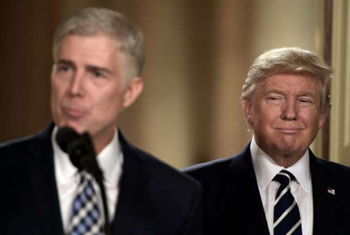Washington, Feb 2: President Donald Trump has seized a chance to swing the US Supreme Court back to conservative leanings but a drawn-out battle loomed Wednesday over this and other nominations, jarring with his vow to sweep aside politics as usual.

Trump, in the second week of his already-unorthodox presidency, nominated Judge Neil Gorsuch to replace conservative justice Antonin Scalia, whose death last year sent the Supreme Court rocketing to the top of the list of presidential campaign issues.
"He'll be approved very quickly," Trump declared on Wednesday.
But that confidence belies what looks to be a tough confirmation fight in the Republican-controlled Senate, after Trump's party refused for much of last year to fill the vacant court seat with Barack Obama's nominee.
Trump is pushing for Senate Republicans led by Mitch McConnell to prevent a likely Democratic filibuster by using what is known as the "nuclear option."
That procedure would change Senate rules to push Gorsuch through with a simple majority in the 100-seat chamber rather than a supermajority of 60 votes. Republicans hold 52 Senate seats.
"If we end up with that gridlock I would say, 'If you can, Mitch, go nuclear,'" Trump said on Wednesday.
Senate minority leader Chuck Schumer pushed right back.
"The answer should not be to change the rules of the Senate, but to change the nominee to someone who can earn 60 votes," Schumer said.
McConnell has not revealed whether he would seek to invoke the nuclear option.
The acrimonious row over Trump's ban on travelers from seven Muslim-majority countries has further complicated efforts to get his cabinet nominees confirmed.
Secretary of state pick Rex Tillerson, the former chief executive of ExxonMobil, was expected to be confirmed in a Senate vote Wednesday.
But some Democrats demanded further review of his record. Tillerson "needs to tell us where he stands on this dangerous policy," Senator Martin Heinrich said.
'Governing By Tantrum'
Democrats have vowed to slow-walk confirmation votes on several cabinet nominees.
Their boycott of votes on two Trump picks was dramatically overturned Wednesday when leaders of the Senate finance committee suspended the panel's rules and approved the nominees for Treasury, Steven Mnuchin, and health, Tom Price, with no Democrats present.
Democrats also boycotted a committee vote Wednesday for Scott Pruitt, Trump's choice to head the Environmental Protection Agency.
Republican Senator Jerry Moran, speaking to a half-empty hearing room, described it as "governing by tantrum."
Despite the obstruction, Trump's attorney general pick Jeff Sessions was finally approved by the Senate Judiciary Committee Wednesday following an eight-day delay.
The Supreme Court is likely to be a protracted fight.
If confirmed, Gorsuch would tilt the bench five-to-four in conservatives' favor.
At 49, the silver-haired jurist from Colorado with a flair for writing incisive rulings is the youngest nominee in a generation.
His appointment could have a major impact on cases ranging from business regulation to gender rights to gun control.
'Special Burden'
Gorsuch was a remarkably orthodox pick for a president who has scythed through norms and precedent during his brief time in office.
Like Scalia, Gorsuch is considered an "originalist" -- guided in his legal thinking by the constitution's original intent and meaning.
Democrats warn they will probe carefully to ensure that he holds centrist views and is not intent on rewriting existing law.
Schumer, on the Senate floor, charged that the new administration has shown "less respect for the rule of law than any in recent memory," placing a "special burden on this nominee" to be an independent jurist.
The Supreme Court is the final arbiter of many of the most sensitive issues of US life and law. Its members are named to life terms so their influence is long-lasting.
With an eye to a bitter Congressional fight Gorsuch headed Wednesday to Capitol Hill with Vice President Mike Pence to huddle with McConnell.
"We're all thrilled" with Trump's pick, the Senate majority leader said, as he expressed eagerness to begin the confirmation process.





Comments
Add new comment